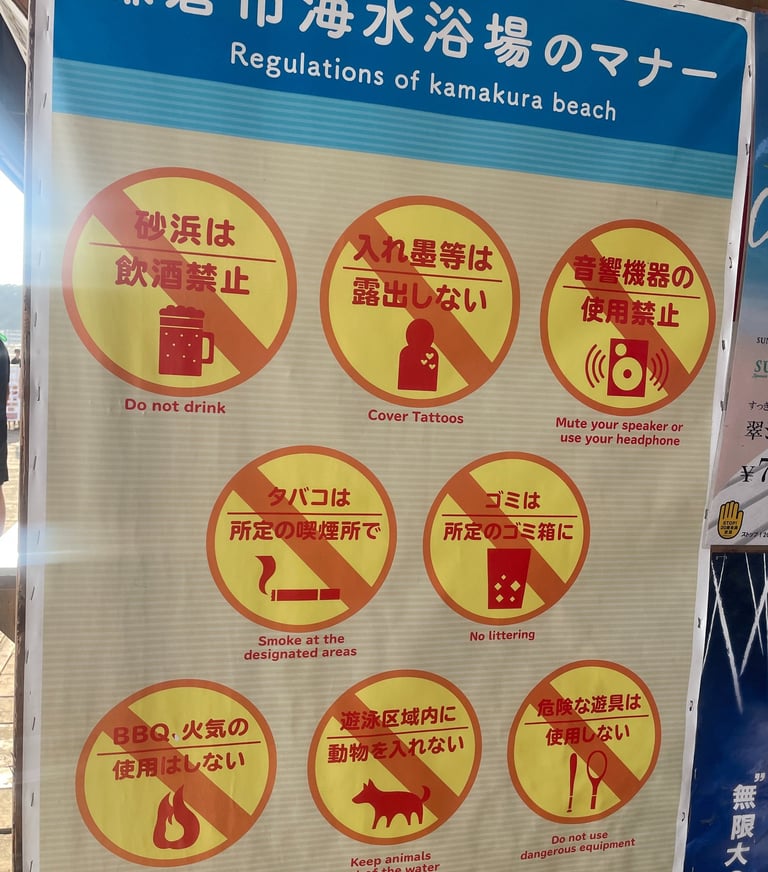Traveling Japan with Tattoos: Essential Tips for a Stress-free Adventure
Discover essential tips for navigating Japan with tattoos. From finding tattoo-friendly accommodations and onsens, to must-know tips and tricks.
Ruzha
8/10/20246 min read


For travelers with tattoos, navigating Japan can present unique challenges! While tattoos aren't illegal in Japan, cultural perceptions mean they're often unwelcome in certain places.
While tattoos are a form of fashion in the west, in Japan they have been stigmatized due to their connections with crime groups, and associated with violence. Some old-fashion people still look at those who are tattooed, as someone ‘scary’.
With a little preparation, you can fully immerse yourself in all that Japan offers, even with visible ink. This guide aims to equip you with essential knowledge and practical tips for a fantastic tattoo-friendly trip to Japan.
Where to cover your tattoos?
While walking in public or riding trains with tattoos is not an issue (you might still get some looks, especially from elderly folks), it’s important to be aware of those tricky, challenging places for ink enthusiasts.
Here are some common places where you might encounter a no-tattoo policy:
Accommodation: Most hotels and hostels won't have issues with tattoos. However, guesthouses or traditional Japanese inns (ryokans) might have stricter policies. Check their websites or contact them beforehand to confirm.
Onsen and Sento: Onsen, Japan's renowned natural hot springs, are cherished for their relaxation and communal bathing traditions. To preserve this tranquil atmosphere, many onsen facilities enforce strict bathing rules, as well as policies prohibiting entry to individuals with visible tattoos. Sento, public baths, using heated water as opposed to natural spring water might have similar policies, although they tend to be more relaxed and allow tattoos more often then onsen.
Beaches, Pools and Gyms: Similar to onsen, many beaches, pools and gyms may not allow entry with visible tattoos. Many pools and water parks and gyms have strict rules against visible tattoos, and even small tattoos can result in denial of entry. Guards at beaches may approach you and ask you to cover up any visible tattoo. Some beaches have a ‘family area’ where parents and kids can safely play on the beach. Those areas might have a ‘no-tattoo’ policy.
We will discuss each of these categories below, and explain what your options are if you have tattoos, but want to experience these places.
Onsen Bathing With a Tattoo
If you would like to experience a hot spring in Japan but have a tattoo, you still have some options! Here are our top tips and recommendations.
Research and pick a tattoo-friendly onsen: Luckily, the number of onsen accepting tattoos is growing. Popular onsen towns such as Hakone near Tokyo, Kusatsu and Ikaho in Gunma, Arima in Hyogo, Nozawa Onsen in Nagano and Beppu in Oita have many tattoo-friendly onsen facilities.
Covering small tattoos: Traditional bathing customs require nudity, making it challenging to conceal tattoos. If your tattoos are small, you may cover them using skin-color waterproof bandages.
Book a private onsen. Did you know that some public onsen also have smaller baths you can book privately? It won’t be the full experience of experimenting with different baths and different temperatures at the big public onsen, but sometimes small cozy onsens can be very relaxing.
Walk in and ask the staff: If you find yourself near an onsen, don't hesitate to ask the staff about their tattoo policy. Inquire politely: If unsure, politely ask at the reception if tattoos are permitted (Tattooは大丈夫ですか? - “Tattoo” wa daijoubu desu ka?). Smaller onsen, especially on weekdays when less crowded, might be more lenient towards small, discreet tattoos. However, it's essential to respect their decision if they decline entry. You may also look for signs outside the establishment or browse their website beforehand.
Our Travel Planners’ Favorite Tattoo-Friendly Public Onsens:
Kusatsu Onsen (Gunma) - a quintessential onsen town with many tattoo-friendly public onsen. Enjoy discounted entry to three of the larger onsens with a convenient onsen pass, while smaller establishments offer free admission.
Hyotan Onsen (Beppu, Oita) - the only Michelin Three Star hot spring in Japan with outstanding facilities
Hottarakashi Onsen (Yamanashi) - outdoor onsen with magnificent views of Mt. Fuji
Finding a Tattoo-Friendly Ryokan
You can find a way to experience a ryokan as well, with proper research and preparation. Here are our top suggestions:
Research Onsen Towns: Certain hot spring towns, like Kusatsu, Ikaho and Nozawa Onsen, are known for being more relaxed about tattoos. Many ryokans in these areas cater to foreign tourists and will be more understanding. And remember, if you visit an onsen town, there’s no need to bathe at the ryokan. There will be plenty of options so you can go to a bigger onsen facility in the town that allows tattoos.
Book a room with onsen: Higher-end ryokans offer rooms with a private onsen in your own room! Often those are open-air baths.
Book a private onsen in the ryokan: Just like onsens, many ryokans offer smaller private onsen for guests, which you can enjoy freely regardless of tattoos. Just ask at the reception and book your spot! An additional fee might be required.
If you're unsure about the policy, contact the ryokan directly and ask about their policy on tattoos. Most ryokan websites won't explicitly mention tattoos, so a quick email can clarify things. Keep in mind that many ryokans are managed by senior owners who may not speak English, so in some cases, you might need to get some help contacting them.
In the case of pools, there aren't many pools in Japan that explicitly allow tattoos. However, some places might be more lenient than others, especially with smaller tattoos. Hotel pools catering to international guests may be more relaxed about tattoo policies.
As for gyms, most of them are not tourist friendly and often require a complex registration process, and on top of that, most have a no-tattoo policy.
Even international chains such as ‘Anytime Fitness’, might not allow people with tattoos. Make sure to check in advance the policy for each branch.
Planning and Preparation Tips
Different areas in Japan have varying attitudes towards tattoos. To avoid disappointment, research specific destinations and accommodations beforehand. Check websites, read Google Maps reviews, or contact establishments directly to inquire about their tattoo policies. Some places may be "tattoo-friendly" or offer private onsen options.
Pack versatile clothing that can easily cover your tattoos. Long-sleeved shirts, light jackets, arm covers, and scarves are practical options. For smaller tattoos, waterproof bandages can provide temporary concealment.,
Be Respectful and Discreet. If you are denied entry to a place due to your tattoos, please respect the establishment's policy. Arguing with staff will cause unnecessary discomfort and is unlikely to change the situation. To avoid potential issues, it's best to cover up your tattoos in places like temples, shrines, and traditional inns (ryokan). When in doubt, it's always safer to be cautious.
Japan is gradually becoming more open to tattoos as global attitudes shift. By respecting local customs and being mindful of others, we as travelers can help create a more inclusive atmosphere for everyone.
Remember, with a little planning and cultural awareness, you can have an amazing and enriching trip to Japan, even with visible tattoos. Embrace the unique experiences Japan has to offer, respect local customs, and be open to exploring the hidden gems beyond the tattoo restrictions.
Feeling overwhelmed by planning a tattoo-friendly Japan trip? Let Japan by Locals guide you through the process. We'll help you create an unforgettable experience without the tattoo worries.






Unfortunately, finding beaches in Japan that are explicitly tattoo-friendly can be challenging. While there's no definitive list of tattoo-friendly beaches, some travelers have reported more lenient attitudes in certain areas. Known for its laid-back atmosphere, Okinawa might be more accepting of tattoos. Some beaches in the Shonan Coast area, like Kamakura and Enoshima, have been mentioned as being more relaxed about tattoos even when no tattoos signs are present (see the picture attached, taken at Kamakura beach on August 2024, even if there were several people with visible tattoos). However, this information should be taken with a grain of salt, as experiences can vary. Smaller, less populated beaches might be more tolerant.
Wearing long-sleeve sun-protective clothing is common at Japanese beaches and water parks, so this can be a practical option. For larger or more prominent tattoos, consider wearing a rashguard or light shirt when entering beach areas or interacting with others.
Important note: Even if you hear positive reports about a specific beach, it's essential to be prepared for potential restrictions. Always be respectful of local customs and be ready to cover up if necessary.


